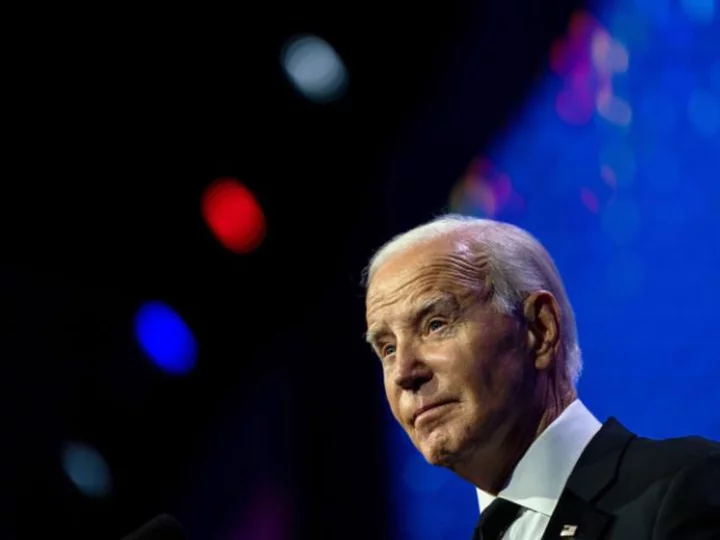The US is allowing Israel to make its own calls on timing and strategy in its war with Hamas, but US President Joe Biden did weigh in on the matter during his visit with Israeli Prime Minister Benjamin Netanyahu and the war cabinet in Tel Aviv earlier this week, according to a senior administration official.
"He asked some hard questions" about what was being planned and what the effects would be, the official told CNN, adding: "We're not directing the Israelis, the timeline is theirs -- their thinking, their planning."
The White House late Friday sought to clarify a brief comment made by Biden after he was asked by a reporter whether Israel should delay a ground invasion in Gaza until more hostages can get out. As he climbed the stairs to Air Force One, the president responded, "Yes."
The White House immediately moved to explain the president's comments -- which could be seen as the US staking out a role in the war between Israel and Hamas that erupted on October 7.
"The president was far away. He didn't hear the full question. The question sounded like 'Would you like to see more hostages released?' He wasn't commenting on anything else," White House communications director Ben LaBolt said less than an hour after the president's comment, according to the press pool.
Earlier Friday, Hamas released two American hostages in a deal brokered by the Qatari government. A number of foreign nationals were among those kidnapped by Hamas, but information about the status, location and identity of all the hostages remains scarce.
As CNN has reported, the US and its allies have been urging Israel to be strategic and clear about its goals if and when it launches a ground invasion of Gaza, warning against a prolonged occupation and placing a particular emphasis on avoiding civilian casualties, according to US and Western officials.
During the October 7 attack, Hamas militants killed more than 1,400 people, including civilians and soldiers, according to Israeli authorities. It was the most deadly attack by militants in Israel's 75-year history and revealed a staggering intelligence failure by the country's security forces.
Israel has since responded by enacting a blockade on Gaza and launching a barrage of airstrikes into the Palestinian enclave, sparking a humanitarian crisis. Israeli airstrikes in Gaza have killed more than 4,100 people, according to the Palestinian health ministry.
Biden suggested earlier Friday that Hamas' attack on Israel was in part to derail US-backed efforts to normalize Israel-Saudi relations.
"One of the reasons Hamas moved on Israel ... they knew that I was about to sit down with the Saudis," Biden told supporters at a campaign fundraiser in Washington, according to a pool report.
"Guess what? The Saudis wanted to recognize Israel," Biden said at the event, which was hosted at the home of a Democratic National Committee official in Washington. The president added that the Saudis were "about to recognize Israel."
The president has maintained in recent weeks that the effort to normalize relations between Israel and Saudi Arabia "is still alive" and remains crucial amid the ongoing conflict, though he has said "it's going to take time to get done."
"The Saudis, and the Emiratis and other Arab nations understand that their security and stability is enhanced if there's normalization of relations with Israel," Biden told CBS News in an interview that aired Sunday, adding that "the direction of moving into the normalization makes sense for the Arab nations as well as Israel."
The war between Israel and Hamas has raised concerns that it could widen into a regional conflict that could snowball into an even greater geopolitical crisis. With US Secretary of State Antony Blinken's trips to multiple Middle Eastern countries, including Saudi Arabia, and Biden's visit to Israel this week, the administration has attempted to make clear that they remain hopeful and committed to a normalization deal.
A senior US official told CNN last month that Biden and Netanyahu discussed normalization efforts "in some depth" during a September meeting. Netanyahu and Saudi Crown Prince Mohammed bin Salman expressed optimism that they were close to reaching a deal with Netanyahu telling CNN last month that the agreement would "change the Middle East forever" and would be a "quantum leap" in the region.
However, when repeatedly asked by CNN's Kaitlan Collins at the time what kind of concessions he would make to get the deal across the line, Netanyahu refused to answer. MBS had previously said a deal to recognize Israel would have to "ease the life of the Palestinians" though he stopped short of calling for an independent Palestinian state to be established, which has been the kingdom's official position for decades.

